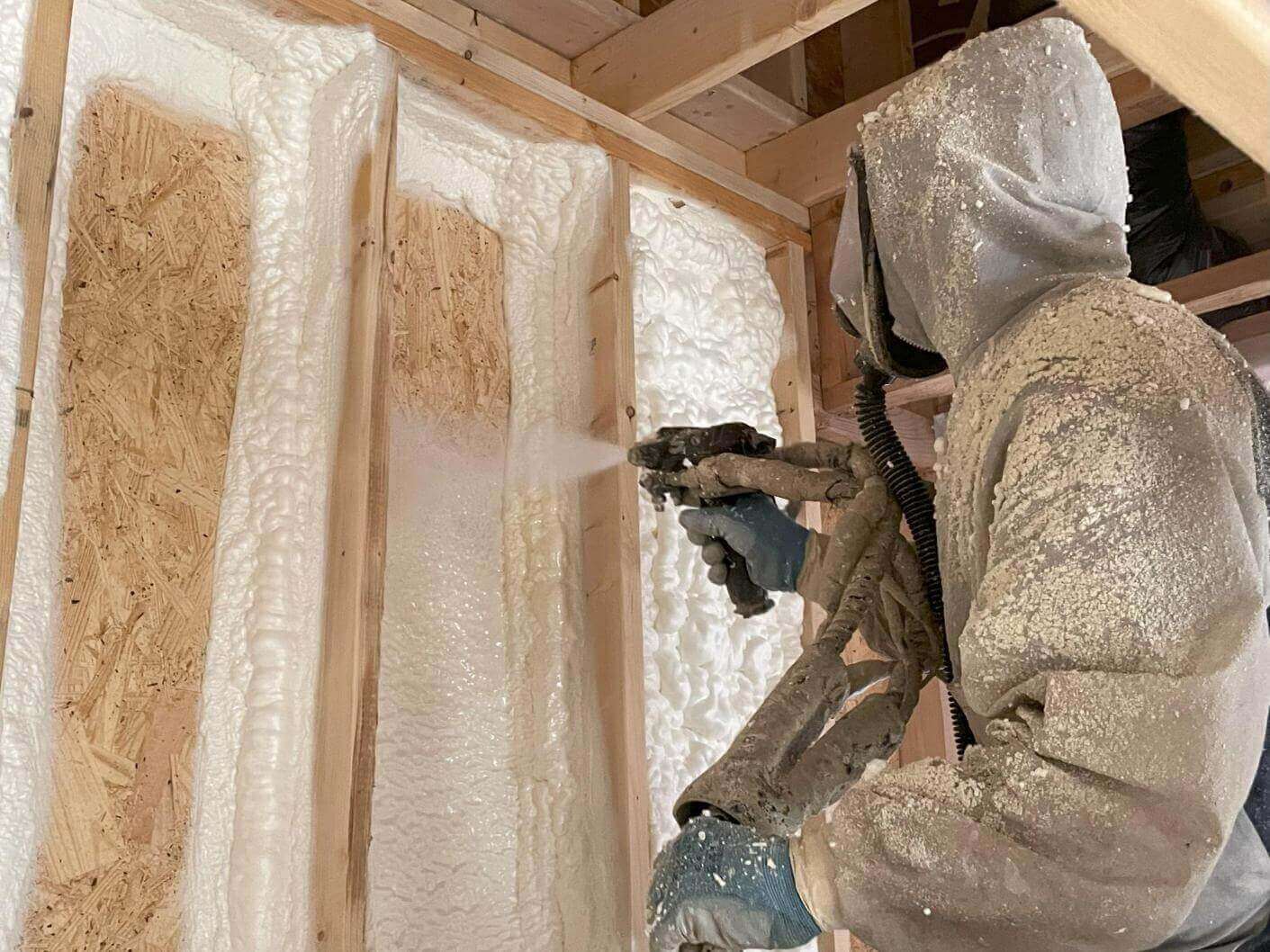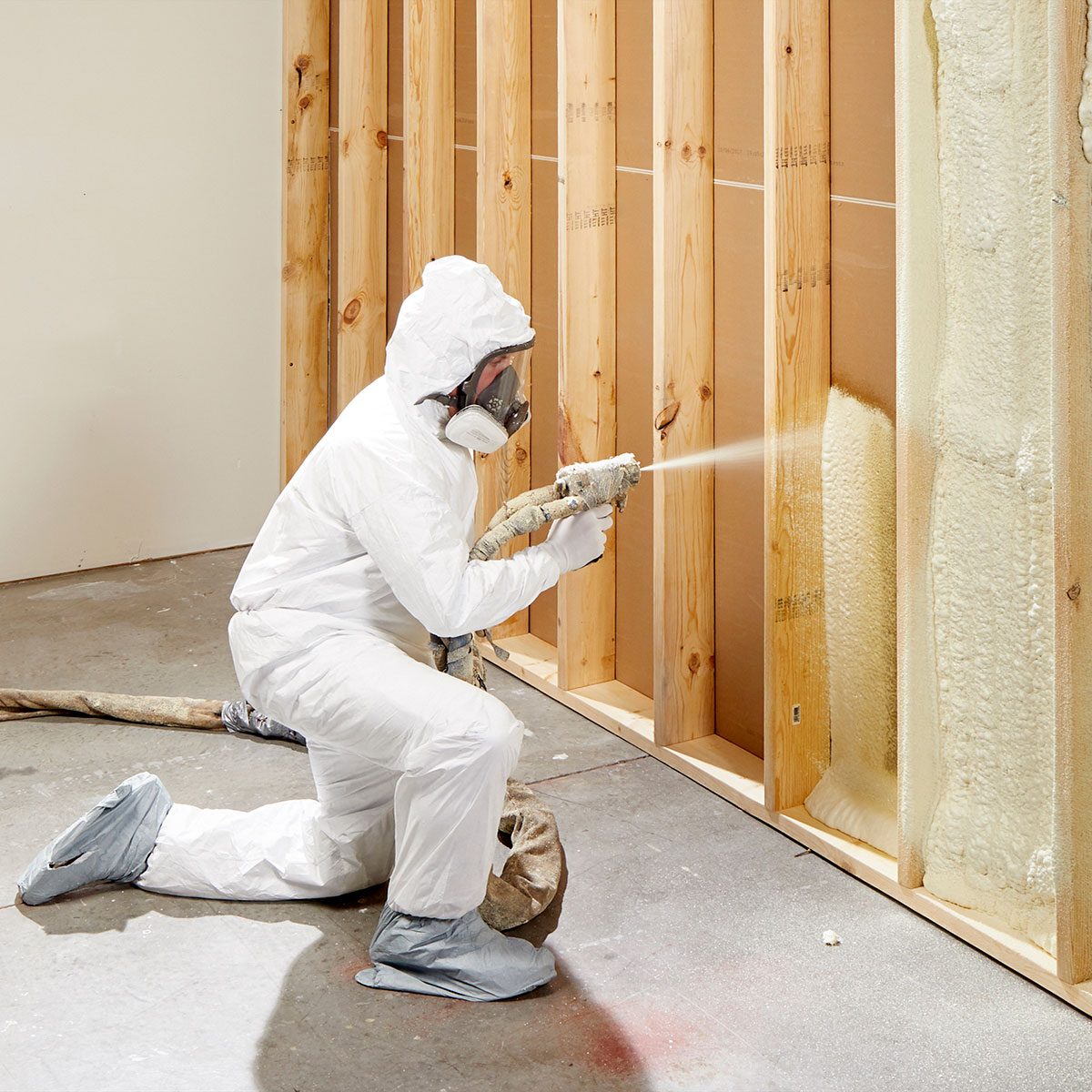Typical Myths About Spray Foam: Debunking the Misconceptions
Typical Myths About Spray Foam: Debunking the Misconceptions
Blog Article
Spray Foam: The Ultimate Service for Air Sealing and Insulation
Spray foam insulation has emerged as a leading option for reliable air sealing and thermal insulation, providing an one-of-a-kind combination of properties that set it apart from conventional approaches. Understanding the full scope of its benefits, installment procedures, and comparisons with other insulation types is critical for making notified decisions.
What Is Spray Foam?
Spray foam is a functional insulation product that incorporates the concepts of air securing and thermal resistance to boost energy efficiency in structures. Made up primarily of polyurethane or various other similar compounds, spray foam is used as a fluid that broadens upon contact with surfaces, developing a strong, constant layer of insulation. This distinct home permits it to fill up gaps, splits, and gaps that standard insulation materials might ignore, giving an exceptional air seal.
There are two major types of spray foam: open-cell and closed-cell. Open-cell spray foam is lighter and a lot more flexible, supplying outstanding audio absorption and a lower R-value per inch - Spray Foam. In comparison, closed-cell spray foam is denser, offering a greater R-value, moisture resistance, and included architectural stability to constructing components
The application procedure usually entails specific tools, guaranteeing a smooth application that sticks to numerous substratums, including concrete, metal, and timber. This flexibility makes spray foam appropriate for both brand-new constructions and retrofitting existing structures. Its capacity to create a closed obstacle substantially adds to decreasing energy intake and enhancing interior air top quality, thus making it a recommended choice among house owners and contractors alike.
Benefits of Spray Foam Insulation
Among the most considerable advantages of spray foam insulation is its remarkable capacity to develop a constant air obstacle, which successfully minimizes power loss. Unlike typical insulation materials, spray foam increases to fill fractures and voids, ensuring that air leak is dramatically decreased. This particular not just boosts power performance yet also causes decrease energy expenses with time.
Additionally, spray foam insulation offers exceptional thermal resistance, adding to an extra secure indoor setting. Its high R-value per inch enables effective insulation in confined spaces, making it optimal for attic rooms, walls, and crawl areas. The moisture-resistant homes of spray foam aid protect against mold and mildew development, promoting healthier living problems.
An additional vital advantage of spray foam insulation is its sound-dampening high qualities (Spray Foam). It effectively lowers noise transmission between areas, producing a quieter and much more comfortable home atmosphere. The toughness of spray foam likewise stands apart, as it does not droop or work out in time, maintaining its efficiency throughout its life expectancy
How Spray Foam Functions
Understanding how spray foam insulation functions is necessary for appreciating its performance in air securing and thermal resistance. Spray foam insulation contains two main parts: isocyanate and polyol material. When these components are blended, they undertake a chemical reaction that triggers the material to increase rapidly, developing a dense foam that loads tooth cavities, fractures, and gaps.
As the foam increases, it abides by surfaces, developing an airtight seal that significantly lowers air seepage. This particular makes spray foam insulation extremely effective at preventing drafts and dampness infiltration, which can result in power loss and damage gradually. Additionally, the closed-cell variation of spray foam uses remarkable thermal resistance because of its inflexible structure, properly minimizing warm transfer.
The one-of-a-kind buildings of spray foam enable it to adapt irregular surfaces, making sure comprehensive coverage and a seamless obstacle. As an outcome, spray foam insulation not just enhances power effectiveness but likewise adds to improved indoor air quality by minimizing the buildup of allergens and contaminants. Eventually, recognizing the auto mechanics behind spray foam highlights its role as a remarkable selection for insulation and air sealing in both business and household applications.
Installation Process Overview

Before setup, the area must be sufficiently cleaned and prepped, guaranteeing that surface areas are totally free from dirt, particles, and moisture. Because contaminants can compromise adhesion and overall performance, this step is important. When the location is prepared, the application entails blending the two components of the spray foam, which increases upon call and loads gaps successfully.
Educated professionals ought to carry out the installation, making use of specialized equipment to guarantee consistent protection and ideal thickness. Safety and security safety measures, consisting of putting on safety equipment and making certain proper air flow, are vital throughout this procedure. After application, the foam commonly cures rapidly, developing a strong obstacle that boosts power performance.
Contrasting Spray Foam to Standard Insulation
When examining insulation alternatives, spray foam insulation sticks out in contrast to conventional materials such as fiberglass and cellulose. One of the key benefits of spray foam is its remarkable air sealing capabilities. Unlike fiberglass and cellulose, which can allow air seepage, spray foam expands upon application, filling gaps and crevices to develop an impermeable seal. This causes improved energy performance, as much less heated or cooled down air runs away the home, causing reduced utility expenses.
In addition, spray foam supplies a greater R-value per inch than standard insulation kinds, using even more efficient thermal resistance in a thinner profile. This particular is particularly advantageous precede with limited dental caries depth. Moreover, spray foam is immune to moisture and mold development, which can be a substantial interest in cellulose and fiberglass, specifically in moist environments.
However, spray foam insulation normally lugs a higher in advance price than its Check This Out traditional counterparts. Home owners should evaluate this first financial investment against long-term power savings and efficiency benefits. Inevitably, while both insulation types offer their function, spray foam becomes a much more sophisticated solution for contemporary insulation requirements, especially in regards to air sealing and thermal performance.

Final Thought
In summary, spray foam insulation stands for a highly efficient option for achieving optimum air sealing and thermal resistance. Its one-of-a-kind buildings, including wetness resistance and sound dampening, make it appropriate for various applications in both brand-new building and constructions and retrofitting jobs (Spray Foam). The first prices might be higher contrasted to conventional insulation products, the long-lasting benefits, such as considerable energy savings and improved indoor air top click to investigate quality, warrant the financial investment and emphasize its worth in modern-day building practices.
Spray foam insulation has actually emerged as a leading option for efficient air sealing and thermal insulation, providing a special mix of residential or commercial properties that set it apart from traditional approaches.Spray foam is a flexible insulation product that incorporates the principles of air sealing and thermal resistance to enhance energy performance in buildings.When reviewing insulation alternatives, spray foam insulation stands out in comparison to standard products such as fiberglass and cellulose. Eventually, while both insulation kinds serve their function, spray foam arises as a much more innovative service for modern insulation requirements, particularly in terms of air securing and thermal efficiency.
In recap, spray foam insulation represents a very effective remedy for achieving optimum air sealing and thermal resistance.
Report this page